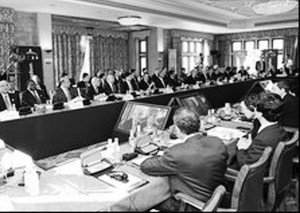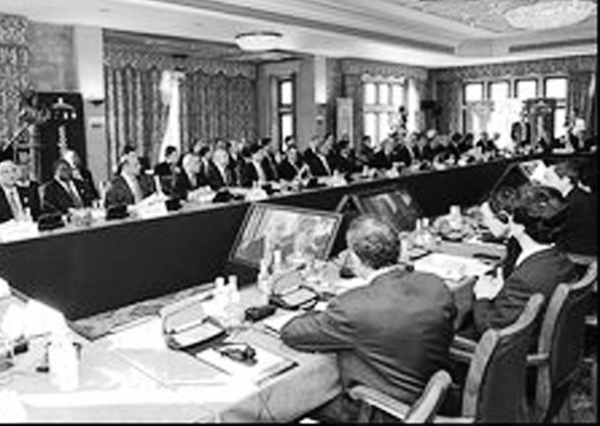HORSHAM, England (Reuters) – G20 finance ministers promised money yesterday to rescue troubled emerging market economies and said they would use their full fiscal and monetary firepower to combat the worst downturn since the 1930s.

Ministers from the world’s largest economies also pledged to regulate hedge funds and start closer checks on credit ratings agencies to prevent a repeat of a financial markets crisis that is crippling businesses and putting millions more out of work.
“We are committed to deliver the scale of sustained effort necessary to restore growth,” the ministers said in a statement promising extra money for the International Monetary Fund and regional lenders such as the Asian Development Bank.
No figure was published but one official attending the talks told Reuters they centred on more than doubling the $250 billion currently at the IMF’s disposal to help countries hit by a halt to credit and investment.
Separately, British Prime Minister Gordon Brown, who hosts a summit of G20 leaders on April 2, said “massive change” was about to take place in financial market regulation, notably supervision of hedge funds and other areas currently only lightly regulated.
The statement issued by the ministers after talks to prepare that summit said hedge funds should be registered and disclose information needed to keep tabs on risk, and it said credit ratings agencies should be better controlled too.
It said the top priority now was to get lending, lifeblood of the economy, flowing normally again.
The ministers set aside differences on the scale of public spending deployed to support activity, saying everyone would do all they can to fight what the IMF calls the “Great Recession.”
The G20 accounts for over 80 per cent of the world’s output, or gross domestic product, which is expected to shrink in 2009 by more than any year since the 1930s after the financial crisis that erupted in the United States in 2007 engulfed confidence, activity, trade and jobs worldwide.
The United States has yet to detail how it plans to clean up banks’ toxic assets, which many say is vital to get a sclerotic economy moving again, though a US official said details could be expected in the coming week.
The G20 issued a separate set of guidelines for countries to use in planning to rid banks of rotten assets.
“You’re going to see us announce relatively quickly a new framework, a new financing framework, for these legacy assets,” US Treasury Secretary Timothy Geithner, who was at the talks in Horsham, south of London, told Fox Business News.
Washington is also preparing to show its hand later this month on regulation of the financial markets, where G20 leaders have yet to put flesh on promises to rein in excess and ensure that everyone has to be called to account from now on.
President Barack Obama sought to stamp out any doubts about US commitment, telling a Washington news conference nobody would pursue regulation more vigorously than him.
Beyond the pledges of better supervision of hedge funds and rating agencies, the newest element from the G20 talks in England was the commitment to help emerging economies, perhaps mindful of the mass exodus of money that marked the Asian financial crisis of the 1990s.
“We really must take action to stop damage being done to the emerging economies, who are seeing money coming out of their systems,” said British Finance Minister Alistair Darling, who hosted the gathering at a luxury countryside hotel in Horsham.
The IMF has already committed nearly $50 billion for bailing out countries in eastern Europe in recent months and is asking for its rescue funding to be doubled to $500 billion.
World Bank chief Robert Zoellick, also attending the meeting on Saturday, said government spending would give the economy no more than a brief “sugar high” if governments failed to rid banks of toxic assets that continue to undermine confidence, trust and the desire to lend or invest.
The United States was demanding earlier this week that other governments commit two per cent of GDP to extra spending to stimulate growth, exposing a rift with the likes of Germany and France who say they are doing enough.
Britain’s Darling said things were on the right track ahead of a summit which Prime Minister Brown and others are billing as time to deliver on promises to make capitalism safer — promises made last November at a first ever meeting of G20 leaders.
“There is this commitment, which is absolutely critical, that the 20 largest economies in the world stand ready to do whatever is necessary for as long as is necessary, and I think that is a major step forward,” Darling said.

